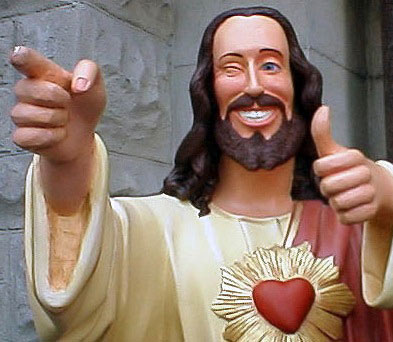Spotlight: Dogma in Dogma: A Theological Guide
Rereading my ten-year-old essay “Dogma in Dogma” today, it occurs to me that I was basically trying to beat Kevin Smith at his own game, to treat Dogma more or less the same way that the film treats dogma.

When I started Decent Films, one of the first tasks I set myself was to offer a critical defense of the objections of believers to controversial films like Dogma and The Last Temptation of Christ — to respond critically to the films’ defenders, and particularly to their criticism of believers and their objections to the films.
In both of these cases, my strategy was to begin by acknowledging all that could be acknowledged on behalf of the film before going on to nail down where I felt the essential problem lay. In the case of Dogma, it was easier to find things to acknowledge on behalf of the film (such as its satiric jabs at the kind of religious banality represented by the “Buddy Christ” image) than in the case of Last Temptation, which I found pretty excruciating from start to finish.
My review of Dogma, also written ten years ago, is about half positive and half negative. I think the basic points still work, although today I prefer the energy and creativity of the companion essay “Dogma in Dogma.”
Taking as its point of departure Roger Ebert’s remark that Kevin Smith’s Dogma “takes Catholic theology absolutely literally,” “Dogma in Dogma” spends most of its time noodling the movie’s theological conceits with straight-faced satire before pulling out the serious punches. That’s basically what Smith does with Catholicism, and I’d like to think that Smith himself would appreciate the turnabout.
Read the essay.
Recent
- Crisis of meaning, part 3: What lies beyond the Spider-Verse?
- Crisis of meaning, part 2: The lie at the end of the MCU multiverse
- Crisis of Meaning on Infinite Earths, part 1: The multiverse and superhero movies
- Two things I wish George Miller had done differently in Furiosa: A Mad Max Saga
- Furiosa tells the story of a world (almost) without hope
Home Video
Copyright © 2000– Steven D. Greydanus. All rights reserved.